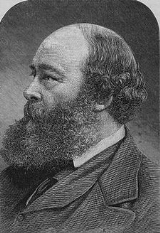
, GCVO
, PC
(3 February 1830 – 22 August 1903), styled Lord Robert Cecil before 1865 and Viscount Cranborne from June 1865 until April 1868, was a British Conservative
statesman and thrice Prime Minister
, serving for a total of over 13 years. He was the first British Prime Minister of the 20th century and the last Prime Minister to head his full administration from the House of Lords.
Lord Robert Cecil was first elected to the House of Commons in 1854 and served as Secretary of State for India
in Lord Derby
's Conservative government from 1866 until his resignation in 1867 over its introduction of Benjamin Disraeli's Reform Bill
that extended the suffrage to working-class men.
A gram of experience is worth a ton of theory.![]()
English policy is to float lazily downstream, occasionally putting out a diplomatic boat-hook to avoid collisions.![]()
No lesson seems to be so deeply inculcated by the experience of life as that you should never trust experts. If you believe doctors, nothing is wholesome: if you believe the theologians, nothing is innocent: if you believe the soldiers, nothing is safe. They all require their strong wine diluted by a very large admixture of insipid common sense.![]()
On general grounds I object to Parliament trying to regulate private morality in matters which only affects the person who commits the offence.![]()
Parliament is a potent engine, and its enactments must always do something, but they very seldom do what the originators of these enactments meant.![]()
[Most legislation] will have the effect of surrounding the industry which it touches with precautions and investigations, inspections and regulations, in which it will be slowly enveloped and stifled.![]()
If I were asked to define Conservative policy, I should say that it was the upholding of confidence.![]()

